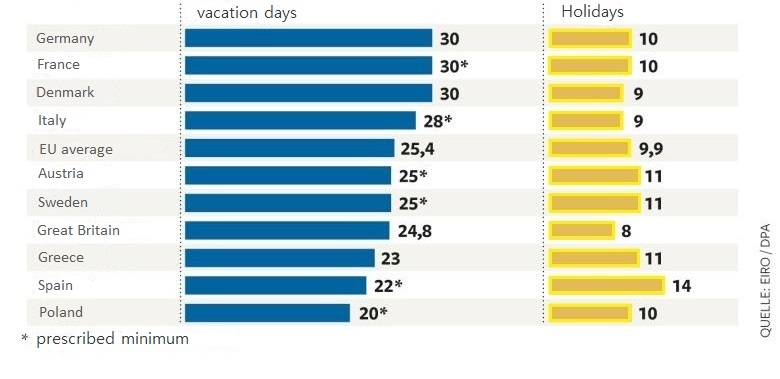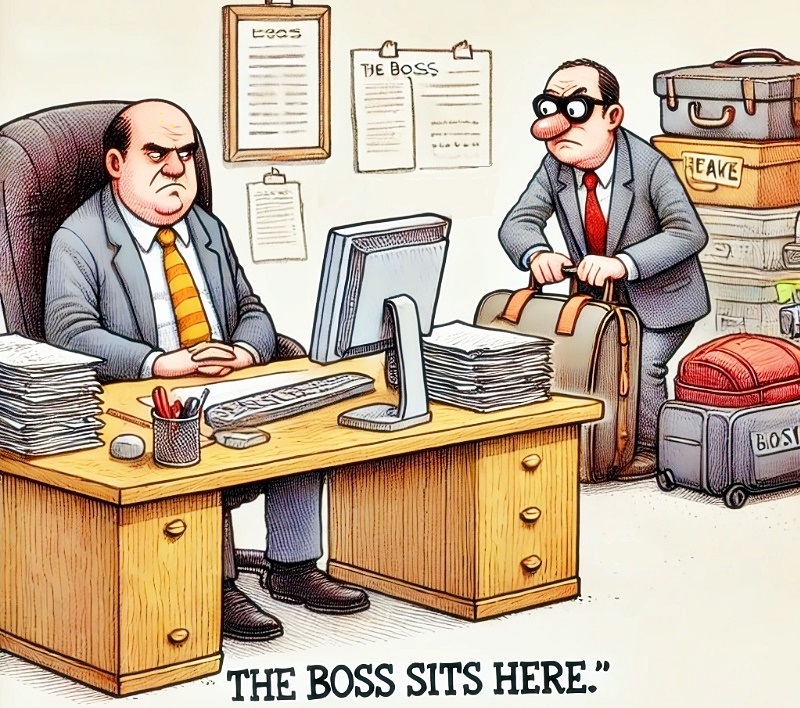HomeTravel informationGood to know
Good to know / Labor law
To what extent can the boss influence vacation time?

Vacation? Not really! When the boss just won't let go!
Finally, vacation! You've been looking forward to it for months, dreaming of rest and relaxation – whether it's hiking in the mountains, sunbathing by the pool, or enjoying a coffee on your own balcony. But as soon as you put your feet up, the phone rings. Again. moreThe boss calls, colleagues send one email after another. "Just a quick question...", "Can you help for a moment?" – and suddenly, your well-deserved vacation feels more like working from home. But is this even allowed? Can your boss really demand that you remain reachable? And what if he even asks you to cancel your vacation? Every year, the battle over vacation time escalates – but where are the boundaries? What rights do you have? And how can you protect yourself?
Average paid vacation and public holidays granted to employees in selected European countries.
 less
less
Unwinding on Vacation

Specifically, this means: If your work phone rings while you're on vacation, you don’t have to answer.
There is no obligation to provide your employer with a phone number or address, nor to check emails or voicemail. Your boss is also NOT allowed to call you back from vacation without a valid reason.The only exception applies to professions with on-call duty, such as firefighters or paramedics. If all colleagues are on duty and a disaster occurs, they may be called back from vacation. less
Can the boss dictate when employees take their vacation?

In the UK, employers have the right to set rules regarding when employees can take their annual leave.
While employees are entitled to 5.6 weeks of paid holiday per year (including public holidays), the employer can:
- Approve or deny holiday requests based on business needs.
- Set fixed holiday periods (e.g., company-wide shutdowns or peak work periods when leave is not allowed).
- Require notice for leave requests (typically twice the length of the requested leave).
- However, employers must follow fair policies and cannot unreasonably prevent employees from taking their statutory leave. Employment contracts or workplace agreements usually specify the exact rules
Company Shutdown: What Employers Need to Consider

However, there is no clear legal limit on the extent of company-wide shutdowns. The Federal Labor Court has previously ruled that up to three-fifths of the annual leave can be designated as company shutdown. Once the company shutdown is legally established, individual vacation plans of employees must be postponed.
If there are urgent operational requirements in your company and a works council exists, they must be involved in the decision regarding the company shutdown. The co-determination rights extend to collective arrangements, such as the introduction of company holidays, but not to the individual vacation duration of employees.
For a successful agreement with the works council, it is crucial to support operational needs with clear, verifiable facts. Employers should explain why the company shutdown is beneficial for the company, for example, to avoid layoffs or short-time work. less
Different in an emergency
 If the company is facing bankruptcy and only you can prevent it, the boss is allowed to call you or even recall you from vacation.
This also applies in disaster situations: for example, in the case of a fire at the company or flood damage.
If this happens, you can claim all the additional costs from your boss – such as for cancellations or a return flight.
The lost vacation days must be made up or compensated for. Your boss is legally required to do this.
If the company is facing bankruptcy and only you can prevent it, the boss is allowed to call you or even recall you from vacation.
This also applies in disaster situations: for example, in the case of a fire at the company or flood damage.
If this happens, you can claim all the additional costs from your boss – such as for cancellations or a return flight.
The lost vacation days must be made up or compensated for. Your boss is legally required to do this.
Tips for a Good Recovery During Vacation

Talk to your boss before you go on vacation!
Our tips
- Inform your boss of your vacation in advance.- Discuss with them who will cover for you.
- Ensure a transparent handover with colleagues and clients.
- If your boss still demands that you work during your vacation, first seek a personal conversation.
- If the boss dismisses your concerns, contact the works council.
- If that is not possible, the only option is to consult a lawyer – preferably a specialist in labor law. less
What is important on vacation

2- In second place, beautiful nature.
3- In third place, hospitality. more
Unlike similar surveys in previous years, swimming opportunities now play a secondary role overall. However, 86% of younger respondents (ages 14 to 29) still place great importance on this, as well as the criterion of "warm weather, lots of sunshine."
For those over 65, on the other hand, in addition to nature, a healthy climate and plenty of peace and relaxation during vacation are important.
The "Top Ten for the Perfect Vacation Happiness," determined through face-to-face interviews with 4,000 participants aged 14 and older, include the following points:
1. A good price-performance ratio (79%)
2. Beautiful nature (73%)
3. Hospitality/friendly staff (73%)
4. Atmosphere/coziness (72%)
5. Lots of harmony (partner, family, friends) (71%)
6. Delicious food (70%)
7. Plenty of peace and relaxation (68%)
8. Warm weather, lots of sunshine (66%)
9. Healthy climate (65%)
10. Easy access/transportation (64%) less
Top 5 reasons

Why do we all need vacation?
2) Vacation gives you energy,
3) Vacation makes you healthy,
4) Vacation makes you sexy,
5) Vacation makes you more satisfied with your job.
Employees should make full use of their vacation days
Especially the last point should be an incentive for every employer to support their nice employees in planning their annual vacation and even encourage them to take time off. mehr Although 85% of all respondents stated that their boss supports them in taking vacation, there are still 52% of respondents who did not use all their vacation days in the past year. On average, 7.2 vacation days remain unused and are likely to expire. Around 63% of respondents who were in a relationship said that their partner would prefer a joint vacation over a material gift. less